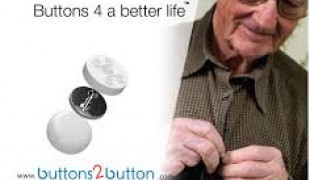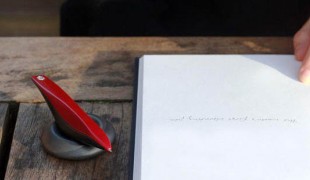- 9745
- 612
- 8
- 11
- 0
- Help Ukraine
About the solution
The spinal cord injury Josh suffered left him quadriplegic with limited use of his arms and hands. The inventor, who has a mechanical engineering degree from Virginia Tech, has invented a device that gives people with tetraplegia the ability to type, use touchscreens and press buttons – tasks that can be extremely difficult and slow for people with limited or no use of their fingers.
Known as the Sixth Digit, the device is an adjustable pinky finger ring with a conductive silicone tip attached to a small stylus. Because it’s worn and not held, it’s much easier to carry and becomes like just another finger. It’s even possible for the wearer to push a manual wheelchair without removing the Sixth Digit because of the device’s small and unobtrusive design. It can be bought online, after Josh had launched a Kickstarter campaign to develop the product.
More info: www.handizap.com
Adapted from: http://www.abilities.com/community/sixth-digit.html
https://www.youtube.com/watch?v=JzqAoqvtKh8
This solution shall not include mention to the use of drugs, chemicals or biologicals (including food); invasive devices; offensive, commercial or inherently dangerous content. This solution was not medically validated. Proceed with caution! If you have any doubts, please consult with a health professional.
DISCLAIMER: This story was written by someone who is not the author of the solution, therefore please be advised that, although it was written with the utmost respect for the innovation and the innovator, there can be some incorrect statements. If you find any errors please contact the patient Innovation team via info@patient-innovation.com
-
-
813
-
0
-
17694

Proloquo2Go – App to help people communicate
CAREGIVING
COMMUNICATION: Communicating, whether by speaking, listening, or other means
Social interaction
Paralysis
Autism
Cerebral Palsy
Brain Stroke
Brain Injury (Abscess, Brain Barrier Defect, Brain Contusion, Brain Hemorrhage, Brain Edema)
Assistive Daily Life Device (to help ADL)
Assistive Technology access
App (Including when connected with wearable)
Tremors
Muscle cramps or spasms
Difficulty coordinating movements
Muscle weakness
Difficulty speaking or understanding speech
Trouble with fine motor skills (e.g., writing, buttoning clothes)
Twitching or involuntary movements (myoclonus)
Acquired language impairment (Aphasia)
Promoting self-management
Managing Neurological Disorders
Building Supportive Community Relationships
Promoting inclusivity and social integration
Improving Speech and Communication
Caregiving Support
Clinical Pathology
Medical Genetics
Neurology
Pediatrics
Rheumatology
Netherlands
-
-
-
468
-
7
-
7628

Woman creates magnetic buttons to help stepfather who has Parkinson's disease get dressed
(SELF)-CARE: DRESSING: Dressing independently.
Grip
CAREGIVING
Parkinson's Disease
Multiple Sclerosis
Bone Disorders (Decalcification, Bone Deformity, Bone Fracture, Bone Infection)
diabetes type 2
Assistive Daily Life Device (to help ADL)
Body-Worn solutions (Clothing, accessories, shoes, sensors...)
Muscle weakness
Tremors
Difficulty coordinating movements
Stiffness or rigidity (difficulty moving)
Limited range of motion
Muscle pain or stiffness
Loss of balance
Reduced grip force (grip)
Trouble with fine motor skills (e.g., writing, buttoning clothes)
Loss of muscle coordination
Muscle cramps or spasms
Joint deformity
Muscle twitching
Numbness or tingling in the extremities
Joint pain or swelling
Promoting self-management
Managing Neurological Disorders
Promoting inclusivity and social integration
Caregiving Support
Endocrinology
Neurology
Orthopedics
Rheumatology
United States
-
-
-
705
-
0
-
15823

Arc Pen - A pen that helps Parkinson's disease to write and relax
Writing (letters, songs, peoms)
COMMUNICATION: Communicating, whether by speaking, listening, or other means
Alzheimer's Disease
Assistive Daily Life Device (to help ADL)
AI algorithm
Tremors
Difficulty coordinating movements
Stiffness or rigidity (difficulty moving)
Muscle weakness
Loss of balance
Trouble with fine motor skills (e.g., writing, buttoning clothes)
Cognitive impairment
Numbness or tingling in the extremities
Twitching or involuntary movements (myoclonus)
Loss of sense of smell (anosmia)
Restoring mobility
Recovering cognitive function
Promoting self-management
Promoting inclusivity and social integration
Neurology
United Kingdom
-
 en
en